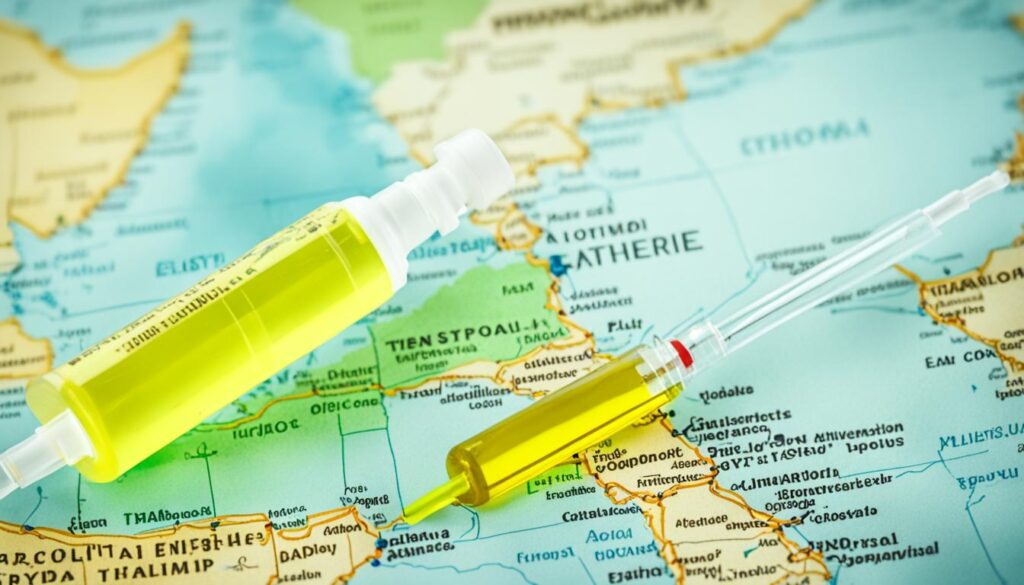Do I Need Yellow Fever Vaccine for Ethiopia?
Did you know that yellow fever is a serious viral disease transmitted by mosquitoes? It can cause fever, muscle pain, jaundice, and even death in severe cases. If you’re planning to travel to Ethiopia, you might be wondering if you need to get vaccinated against yellow fever. The answer depends on various factors, including your destination within Ethiopia and your recent travel history. Let’s explore the yellow fever requirements for Ethiopia and understand why getting vaccinated is crucial for your health and safety.
Key Takeaways:
- Vaccination against yellow fever is recommended for travel to Ethiopia, except for the Afar and Somali provinces.
- Proof of yellow fever vaccination may be required upon entry to Ethiopia, especially if traveling from a country with a risk of yellow fever transmission.
- Stay informed about the latest requirements and make sure your yellow fever vaccination is up to date before traveling to Ethiopia.
- Alongside yellow fever, consider other health precautions such as food and water safety, bug bite prevention, and access to medical care while traveling.
- Enjoy your trip to Ethiopia by taking necessary health precautions and immersing yourself in its rich culture and breathtaking landscapes.
Travel Health Precautions for Ethiopia
In addition to yellow fever vaccination, there are several other health precautions to consider when traveling to Ethiopia. It is important to eat and drink safely by following food and water safety guidelines.
Preventing bug bites is also crucial as bugs like mosquitoes can spread diseases such as malaria and dengue fever. It is recommended to stay safe outdoors by being aware of changing weather conditions and taking necessary precautions. Additionally, it is important to keep away from animals and reduce exposure to germs. Knowing how to access medical care while traveling is also essential.
Food and Water Safety
- Consume bottled or boiled water
- Avoid eating raw or undercooked food
- Choose food from reputable establishments
- Peel fruits and vegetables before consumption
Bug Bite Prevention
- Apply insect repellent containing DEET
- Wear long sleeves and pants, especially during evenings and nights
- Sleep under mosquito nets
- Stay in air-conditioned or screened-in accommodations
Outdoor Safety
- Be prepared for changing weather conditions
- Protect yourself from excessive sun exposure with sunscreen and protective clothing
- Stay hydrated by drinking plenty of water
- Use appropriate gear and equipment for outdoor activities
Animal Avoidance and Germ Reduction
- Avoid contact with wild or stray animals
- Wash hands regularly with soap and clean water
- Use hand sanitizers when soap is not available
- Avoid close contact with individuals who are sick
By taking these health precautions, you can have a safe and enjoyable trip to Ethiopia. Remember to also consult with a healthcare professional or travel health clinic regarding specific immunizations and other health recommendations for your trip.
Vaccinations and Health Risks in Ethiopia

When planning a trip to Ethiopia, it’s essential to be aware of the necessary vaccinations and potential health risks. The Centers for Disease Control and Prevention (CDC) and the World Health Organization (WHO) recommend several vaccinations for travel to Ethiopia, including hepatitis A, hepatitis B, typhoid, yellow fever, rabies, meningitis, polio, and the measles, mumps, and rubella (MMR) vaccine, among others.
Yellow Fever Vaccination: One of the key vaccinations required for travel to Ethiopia is the yellow fever vaccine. Travelers aged 9 months or above arriving from countries with a risk of yellow fever transmission must provide proof of yellow fever vaccination. This requirement aims to prevent the spread of yellow fever and protect both travelers and the local population.
Other Health Risks: In addition to yellow fever, there are other health risks to consider when traveling to Ethiopia. Malaria and dengue fever are prevalent in certain regions, particularly during the rainy season. It’s crucial to take appropriate precautions such as using mosquito repellent, sleeping under insecticide-treated bed nets, and taking antimalarial medication, if recommended.
To ensure a safe and healthy trip, it is recommended to consult with a healthcare professional or travel health specialist at least 4-6 weeks before your departure date. They can provide guidance on the required vaccinations, preventive measures, and any specific health risks associated with your travel itinerary.
Vaccination Recommendations for Travel to Ethiopia
| Vaccinations | Recommended for Travel to Ethiopia |
|---|---|
| Hepatitis A | Yes |
| Hepatitis B | Yes |
| Typhoid | Yes |
| Yellow Fever | Yes (mandatory for certain travelers) |
| Rabies | Recommended for high-risk travelers |
| Meningitis | Recommended for certain travelers |
| Polio | Recommended for certain travelers |
| Measles, Mumps, and Rubella (MMR) | Recommended for all travelers born after 1957, if not previously vaccinated |
| Tetanus | Recommended for all travelers |
Note: The above table provides a general overview of the recommended vaccinations for travel to Ethiopia. However, individual vaccination requirements may vary based on factors such as age, medical history, and specific travel plans. It’s important to consult a healthcare professional for personalized advice.
Safety Tips for Traveling in Ethiopia

To ensure a safe and enjoyable trip to Ethiopia, it is important to take safety precautions. Here are some tips to keep in mind:
1. Stay Alert to Changing Weather Conditions
The weather in Ethiopia can be unpredictable, so it’s essential to stay informed about any potential changes. Check the local weather forecast regularly and be prepared for sudden shifts in temperature or severe weather conditions.
2. Wear Appropriate Clothing and Pack Necessary Items
When venturing outdoors, dress appropriately for the weather and activity. Comfortable and breathable clothing will help you stay cool and protect you from the sun. Don’t forget to pack essentials such as a hat, sunscreen, insect repellent, and a first aid kit.
3. Protect Yourself from UV Radiation
Ethiopia has high altitudes, increasing the risk of sunburn. Wear sunscreen with a high SPF, sunglasses to protect your eyes from harmful UV rays, and a wide-brimmed hat for additional sun protection.
4. Stay Safe Around Water
Whether you’re swimming in a natural body of water or using a hotel pool, always prioritize your safety. Follow water safety guidelines, swim only in designated areas, and never swim alone. Be mindful of currents and always supervise children near water.
5. Avoid Sharing Body Fluids
Engaging in activities that involve sharing body fluids, such as getting tattoos or piercings, increases the risk of contracting infectious diseases. It’s best to avoid these practices during your trip to Ethiopia.
6. Know How to Access Medical Care
Before traveling to Ethiopia, research the local healthcare facilities and know how to access medical care if needed. Keep important phone numbers, addresses, and insurance information handy. It’s also recommended to have travel insurance that covers medical expenses.
“Traveling is an exciting adventure, but it’s essential to prioritize your well-being and safety. By following these safety tips, you can have a memorable experience exploring the beautiful country of Ethiopia.”
| Safety Tips for Traveling in Ethiopia |
|---|
| Stay alert to changing weather conditions |
| Wear appropriate clothing and pack necessary items |
| Protect yourself from UV radiation |
| Stay safe around water |
| Avoid sharing body fluids |
| Know how to access medical care |
Unique Experiences in Ethiopia
Ethiopia is a country that offers a plethora of unique experiences for travelers. From ancient historical sites to breathtaking landscapes, there is something for everyone to enjoy. One must-visit destination in Ethiopia is Lalibela, renowned for its rock-hewn churches that date back to the 12th and 13th centuries. These remarkable churches, carved out of solid rock, are not only architectural marvels but also hold great religious significance. Exploring these ancient structures allows visitors to delve into the rich history and culture of the region.
Addis Ababa, the capital city of Ethiopia, is another attraction that should not be missed. Known for its vibrant culture, bustling markets, and historical sites, Addis Ababa offers a captivating blend of old and new. Visitors can explore the National Museum of Ethiopia, where they can find the famous Lucy skeleton, a significant archaeological discovery. The city also boasts beautiful parks and gardens, such as the Entoto Natural Park, where travelers can escape the urban hustle and enjoy panoramic views of the city.
Ethiopia’s natural beauty is also a major draw for visitors. The country is blessed with stunning landscapes, including the majestic Omo River and the serene Lake Chomo. These natural wonders provide a peaceful retreat for those seeking relaxation and tranquility. For the adventure enthusiasts, Ethiopia offers a range of outdoor activities like hiking and trekking, allowing travelers to immerse themselves in the breathtaking scenery and discover hidden gems off the beaten path.
Top Attractions in Ethiopia:
- Lalibela’s rock-hewn churches
- Addis Ababa’s vibrant culture and historical sites
- Omo River and Lake Chomo’s stunning landscapes
- Hiking and trekking adventures
The diverse culture, rich history, and natural wonders of Ethiopia make it a truly captivating destination. Whether you are a history buff, nature lover, or adventure seeker, Ethiopia has something to offer. Plan your trip to this remarkable country and embark on a journey of exploration and discovery.
What to Pack for a Trip to Ethiopia
When planning a trip to Ethiopia, it’s important to pack the right essentials to ensure a comfortable and enjoyable experience. Consider the climate and activities you’ll be participating in to determine what to bring. Here’s a packing list to help you prepare for your adventure:
Clothing:
1. Rain gear: Don’t forget to pack a waterproof jacket or poncho to stay dry during the rainy season.
2. Comfortable hiking shoes: Ethiopia offers stunning outdoor landscapes, so be sure to bring sturdy hiking shoes for exploring nature’s wonders.
3. Lightweight jacket: Due to varying elevations, temperatures can fluctuate during the day. A lightweight jacket will keep you warm when needed.
4. Breathable and lightweight clothing: Ethiopia’s climate can be hot and humid, so pack comfortable clothes made from breathable fabrics.
Travel Essentials:
1. Insect repellent: Protect yourself from mosquitoes and other insects by packing an effective insect repellent.
2. Sunscreen: Ethiopia’s high altitude increases the risk of sunburn, so be sure to pack a broad-spectrum sunscreen with a high SPF.
3. Travel health kit: Prepare a small kit with necessary medications such as pain relievers, antidiarrheal medication, and any prescription drugs you may need.
4. Smart Traveler Enrollment Program (STEP): Enroll in the STEP program provided by the U.S. Department of State to receive travel alerts and make it easier for the embassy to contact you in case of an emergency.
Additional Tips:
1. Local doctor and hospital information: Carry a list of local doctors and hospitals in Ethiopia in case you need medical assistance during your trip.
2. Travel insurance: Consider purchasing travel insurance to protect yourself against unexpected situations such as cancellations, medical emergencies, or lost belongings.
3. Portable charger and adapter: Don’t forget to bring a portable charger and the appropriate adapters to keep your devices powered up and connected.
| Climate and Season | Recommended Items |
|---|---|
| Dry season (October to May) | Sunscreen, lightweight clothing, sunglasses, hat, comfortable walking shoes |
| Wet season (June to September) | Rain gear, waterproof shoes, extra layers for cooler temperatures |
| High altitude areas | Lightweight jacket, warm layers, gloves, hat |
Remember, it’s always a good idea to pack light and carry only the essentials to ensure easy mobility and avoid excessive luggage. By packing the right items, you’ll be well-prepared for your trip to Ethiopia and ready to make lasting memories.
Conclusion
Traveling to Ethiopia can be a rewarding and exciting experience. By taking necessary health precautions and following safety tips, you can enjoy your trip without any major issues. It is important to stay informed about the latest travel advisories and requirements, and to be prepared with the necessary vaccinations and medications.
When visiting Ethiopia, it’s important to remember some essential travel tips. First, make sure to check for any travel advisories or warnings before your trip. This will help you stay informed about any safety concerns or disruptions that may affect your travel plans.
Additionally, it’s a good idea to carry a copy of your passport and other important documents with you at all times. It’s also recommended to keep a separate record of these documents, along with emergency contact information, in case of any unforeseen situations.
Lastly, while traveling in Ethiopia, it’s important to respect the local customs and traditions. This includes dressing modestly, especially when visiting religious sites, and being mindful of cultural norms and sensitivities. By doing so, you can ensure a respectful and enjoyable experience in this diverse and fascinating country.





